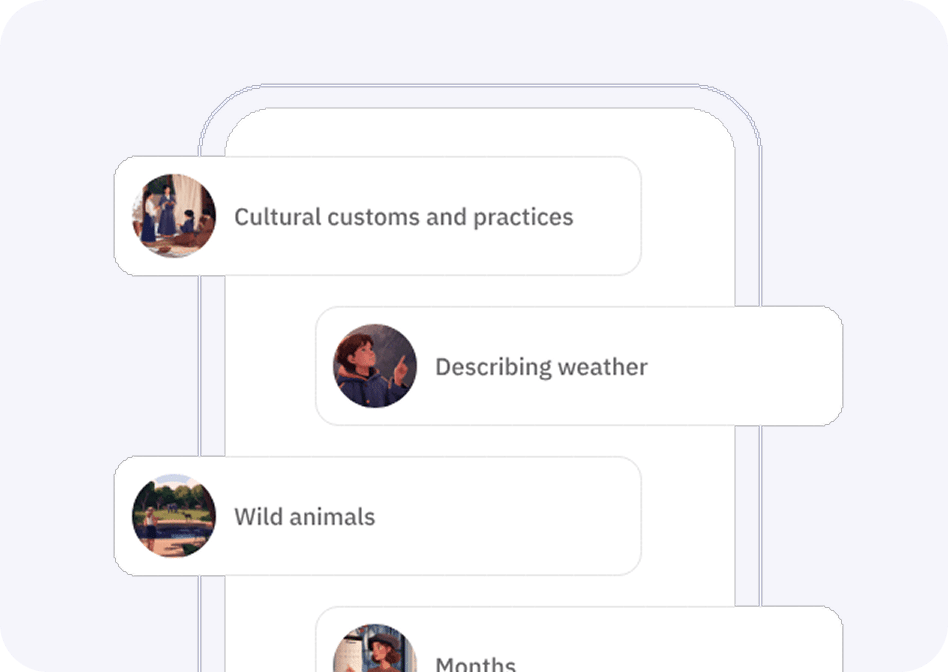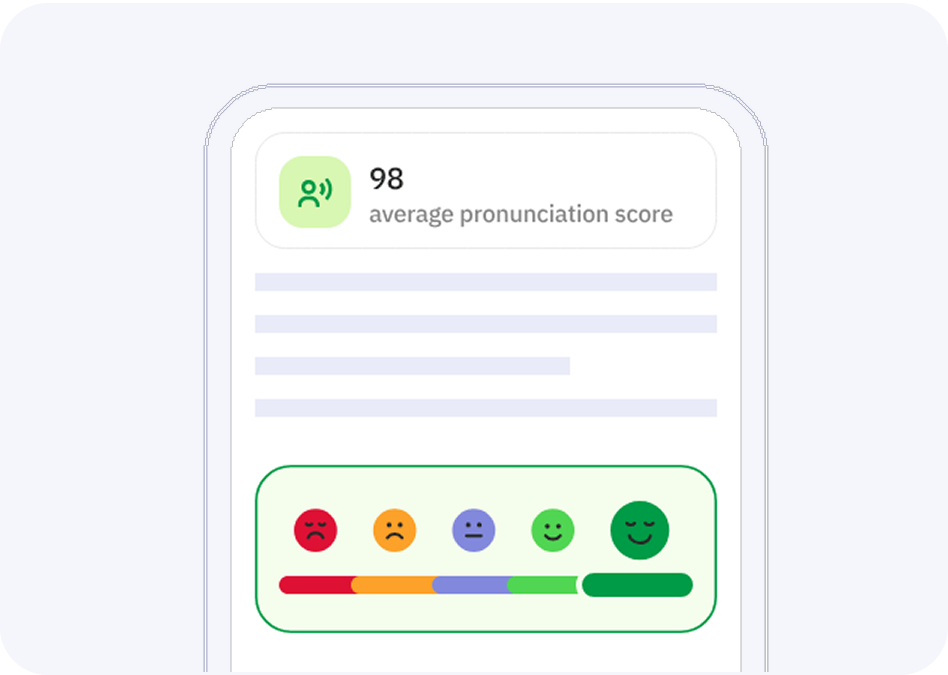Learn Dutch
Start your Dutch language journey with Talkpal! Our platform uses advanced technology to personalize your learning, adapting each lesson to fit your unique style and needs. With interactive activities and engaging content, Talkpal makes learning Dutch both effective and enjoyable – you’ll look forward to every session. Discover how fun language learning can be, and make real progress while staying motivated. Try Talkpal today and see how easy and exciting it is to master Dutch!
Get started
The talkpal difference

Personalized Education
Each person learns differently. With Talkpal's technology, we have the capability to analyze how millions of people learn Dutch at the same time and create the most effective educational platforms tailored to each student's needs.

Cutting-Edge Technology
Our main goal is to lead the way in providing a personalized learning experience for everyone, utilizing the latest advances in cutting-edge technology.

Making Learning Fun
We’ve made learning Dutch a delightful experience. Knowing it can be tough to stay motivated when learning online, we've designed Talkpal to be so engaging that people prefer enhancing their Dutch skills with it over playing a game.
LANGUAGE LEARNING EXCELLENCE
Talkpal Dutch Learning Method
Learning Dutch is a daunting task, but with the right tools and approach, it can be a rewarding experience. In this article, we will explore some effective strategies that can help you achieve fluency in Dutch.

1. Immerse Yourself
One of the most effective ways to learn Dutch is to immerse yourself in it. This means surrounding yourself with the language as much as possible. You can achieve this by watching Dutch movies, listening to Dutch music, or even having conversations with native Dutch speakers. By immersing yourself in Dutch, you'll be able to pick up new words and phrases more quickly, and you'll also start to get a feel for the rhythm and structure of the language.

2. Practice Consistently
Learning Dutch requires consistent practice. Whether it's studying Dutch grammar rules or practicing your speaking skills, it's important to make learning Dutch a part of your daily routine. Consistent practice will help you stay motivated and make steady progress toward fluency in Dutch.

3. Use Available Resources
There are a wide variety of resources available for those learning Dutch, from textbooks to Dutch learning apps. It's important to use a variety of resources to keep your learning experience fresh and engaging. Some resources may be more effective for certain aspects of learning Dutch, such as grammar or vocabulary, so it's important to find what works best for you.

4. Focus on Relevant Vocabulary
When learning Dutch, it can be tempting to try to learn every word in the dictionary. However, this is not the most efficient way to learn. Instead, focus on learning Dutch vocabulary that is relevant to your interests and daily life. This will help you stay engaged with the language and make it easier to retain new words and phrases.

5. Find a Language Partner or Chat
Having a language partner can be a great way to practice your Dutch speaking skills and get feedback on your progress. You can find language partners through language exchange websites or apps, or by joining local Dutch language groups.

6. Set Realistic Expectations
Setting realistic goals is important for maintaining motivation and making progress in your Dutch-learning journey. Whether it's learning a certain number of new words each week or being able to hold a conversation in Dutch, setting achievable goals will help you stay on track and feel a sense of accomplishment as you progress.

7. Don't Be Afraid to Make Mistakes
Learning Dutch is an ongoing process, and making mistakes is a natural part of that process. Don't be afraid to make mistakes, as they can be valuable learning opportunities. Embrace the learning process and focus on making steady progress toward your Dutch learning goals.
The most efficient way to learn a language
Try Talkpal for freeWe Are Talkpal
Learning a new language can be an exciting and challenging experience, especially when it comes to Dutch learning. Mastering Dutch opens up numerous opportunities, both personally and professionally. Talkpal, a language learning platform, has been developing and refining its algorithms for years to provide an optimal learning experience. As technology and language learning continue to evolve, it’s important to understand the benefits of learning Dutch with the latest tech tools.
Benefits of Learning Dutch
Learning Dutch offers several advantages, including enhanced brain function, improved communication skills, and increased job opportunities. Studies have shown that learning a second language, such as Dutch, can boost cognitive abilities like problem-solving and decision-making. Additionally, being bilingual or multilingual provides a significant edge in today’s global workforce. Proficiency in Dutch can open doors to unique job opportunities, especially in Dutch-speaking countries.
Choosing the Right Language Learning Platform
With a wide array of language learning platforms available, selecting the right one for Dutch learning can be daunting. Key factors to consider include the platform’s teaching methodology, language options, and cost. For example, Talkpal employs a chat-based methodology, emphasizing real-life conversations and practical insights, making Dutch learning engaging and accessible.
Talkpal offers a user-friendly interface and promotes learning through conversations with its advanced AI model, making the process less tedious and more enjoyable. This approach helps learners develop fluency more naturally. However, other platforms might offer different teaching methodologies or more comprehensive language options.
It’s crucial to research and compare various platforms to find the one that aligns best with your Dutch learning goals and budget. Talkpal can be a valuable complement to other learning methods you might prefer. Explore Talkpal for free today and experience how easy and fun Dutch learning can be.

Personalized Learning
Harnessing the power of AI and advanced language science, our Dutch learning sessions are tailored specifically to your optimal level and pace. Each piece of content is custom-made for you.

Effective & Efficient
With Talkpal, you can efficiently improve your Dutch reading, listening, and speaking skills. Check out our latest Dutch learning product!

Keep Engaged
With Talkpal, you can efficiently improve your Dutch reading, listening, and speaking skills. Check out our latest Dutch learning product!

Enjoy Dutch Learning
Learning Dutch doesn’t have to be boring! Enhance your Dutch skills daily with captivating exercises and delightful characters. Ask funny or illogical questions and see how Talkpal AI responds.
WHY LEARN DUTCH?
Learning Dutch, the official language of the Netherlands and one of the official languages of Belgium, opens up a world of opportunities and advantages. Dutch is spoken by over 23 million people worldwide and is considered an essential language for trade and international communication. With its close links to English and German, learning Dutch can offer personal, professional, and cultural benefits in various contexts.
Introduction to Talkpal AI
Talkpal AI is an AI-powered language learning app that helps learners improve their speaking, listening, and writing skills. It uses a conversational approach to language learning, allowing learners to practice their Dutch with native speakers and AI-powered chatbots.
Learning Dutch via Talkpal AI is an effective and efficient way to improve your Dutch skills. The app offers a convenient and flexible learning experience, personalized lessons, interactive learning, cost-effective pricing plans, and real-time feedback. Whether you are a beginner or an advanced learner, Talkpal AI can help you achieve your language learning goals.
Benefits of Learning Dutch via Talkpal AI

1. Professional growth
The Netherlands has a highly developed economy and is home to numerous multinational companies such as Philips, Shell, and Unilever. Being able to speak Dutch can give you a competitive edge in the international job market and enhance your career prospects. Additionally, if you are planning to work or study in the Netherlands or Belgium, knowing the local language will help you communicate effectively and integrate seamlessly into the professional environment.

2. Cultural enrichment
The Dutch culture boasts a rich history in the fields of art, literature, and philosophy. Learning Dutch allows you to appreciate the works of famous Dutch artists such as Rembrandt and Vincent van Gogh, as well as renowned authors like Anne Frank and Harry Mulisch. Understanding the Dutch language gives you access to their original works and helps you gain a deeper understanding of their thoughts and ideas. It also enables you to engage with Dutch-speaking people and develop meaningful relationships, thereby enriching your cultural experience.

3. Travel opportunities
The Netherlands and Belgium are popular travel destinations known for their picturesque landscapes, historic cities, and vibrant cultural scenes. Being able to speak Dutch can enhance your travel experience, as it allows you to communicate with locals, navigate through the cities, and immerse yourself in the culture. Moreover, Dutch is also spoken in Suriname, Aruba, and the Dutch Antilles, further expanding your travel opportunities.

4. Expand your language skills
Dutch is closely related to both English and German and shares many similarities in vocabulary, grammar, and pronunciation. Learning Dutch can provide you with a strong foundation to learn other Germanic languages such as German, Danish, or Swedish more easily. As Dutch is considered one of the easier languages for English speakers to learn, it can also serve as an excellent starting point if you plan to become a polyglot.

5. Cognitive benefits
Learning any new language has cognitive benefits, and Dutch is no exception. Studies have shown that learning a foreign language can improve memory, problem-solving skills, and creativity. It can also delay the onset of age-related cognitive decline and improve multitasking abilities. Moreover, learning Dutch can help you develop a better understanding of English, as both languages share many common words and grammatical structures.

6. Access to higher education
The Netherlands is home to several prestigious universities that offer a wide range of courses in English. However, understanding Dutch can give you a better understanding of the local culture, help you communicate with your peers, and make your overall experience more enjoyable. Furthermore, some scholarships and grants might require proficiency in Dutch, so learning the language can open up more opportunities for higher education.
Why is Dutch Difficult?
Learning Dutch is mastering pronunciation. Dutch has a wide range of vowels and consonant sounds, some of which do not exist in other languages. In addition, Dutch words often have irregular stress patterns, making it difficult for learners to predict which syllable should be emphasized.
1. Grammar and Syntax
Dutch grammar can be quite complex, with numerous rules and exceptions. Learners must understand concepts such as subject-verb agreement, tenses, and the use of articles, which can be confusing for those whose native languages have different grammatical structures.
2. Vocabulary and Idioms
Dutch has an extensive vocabulary, with a vast array of words that can be overwhelming for learners. Additionally, navigating idiomatic expressions and slang in Dutch can be challenging, as their meanings often cannot be deduced from the individual words themselves.
3. Spelling
Dutch spelling can be inconsistent, with many words not following standard phonetic rules. This can make it difficult for learners to accurately spell words based on their pronunciation.
4. Understanding Cultural Nuances
Learning Dutch also involves understanding the cultural nuances and social norms of Dutch-speaking countries. This can be challenging for learners from different cultural backgrounds, as they must adapt to new customs and ways of thinking.
5. Dutch Language Learning Strategies
Listening and Speaking
To improve pronunciation and fluency, learners should practice listening to native speakers and engaging in conversation whenever possible. This can be done in person or through online platforms, such as language exchange websites and mobile apps.
Reading
Reading is an essential tool for expanding vocabulary and improving comprehension skills. Learners should read a variety of texts, from news articles to novels, to expose themselves to different writing styles and genres.
Writing
Writing is a crucial skill for Dutch language learners, as it helps solidify grammar and vocabulary knowledge. Learners should practice writing regularly, whether it be through journaling, writing essays, or participating in online forums.
Grammar and Vocabulary
Learners should dedicate time to studying grammar rules and expanding their vocabulary. This can be achieved through textbooks, online resources, or language courses.
6. Different Learning Styles and Approaches
Visual Learners
Visual learners may benefit from using flashcards, watching videos, or using language learning apps that incorporate visual elements.
Auditory Learners
Auditory learners can improve their Dutch skills by listening to podcasts, audiobooks, or watching movies and TV shows in Dutch.
Kinesthetic Learners
Kinesthetic learners may find success in incorporating physical movement into their language learning, such as acting out dialogues, using gestures while speaking, or playing language-based games.
7. Technological Tools for Dutch Language Learning
There are numerous technological tools available to assist Dutch language learners, including mobile apps, websites, and software programs. These tools offer a variety of features, such as interactive lessons, quizzes, and multimedia content, to help learners improve their skills at their own pace.
8. The Role of the Teacher in Dutch Language Learning
A skilled teacher can make a significant difference in a learner’s progress. Teachers can provide guidance, motivation, and personalized feedback to help learners overcome challenges and reach their goals. In addition, teachers can introduce learners to cultural aspects of Dutch-speaking countries, fostering a deeper understanding of the language and its context.
9. The Benefits of Learning Dutch
Learning Dutch offers numerous benefits, including increased job opportunities, access to higher education, and the ability to communicate with people from diverse backgrounds. In addition, learning Dutch can improve cognitive skills, such as problem-solving and critical thinking, and foster personal growth and self-confidence.
10. Conclusion
Dutch language learning presents unique challenges, from pronunciation and grammar to vocabulary and cultural nuances. However, with the right strategies, tools, and support from a skilled teacher, learners can overcome these obstacles and reap the many benefits that come with mastering the Dutch language.
How does Talkpal Work for Learning Dutch?
Talkpal AI employs a conversational method for language learning, enabling learners to practice their Dutch with native speakers and AI-powered chatbots. The app offers a multitude of features, including:

1. Speech Recognition
Talkpal AI utilizes speech recognition technology to analyze learners' speech and provide feedback on their pronunciation, intonation, and rhythm. This helps learners enhance their speaking skills and sound more natural when conversing in Dutch.

2. Conversation Practice
Talkpal AI allows learners to practice their Dutch with native speakers and AI-powered chatbots. This aids learners in improving their listening and speaking skills in a natural, conversational manner.

3. Vocabulary Building
Talkpal AI offers an array of tools for building vocabulary, such as flashcards and word games. This assists learners in expanding their vocabulary and more easily retaining new words.

4. Grammar Practice
Talkpal AI provides grammar practice exercises to help learners refine their grammar skills. The app uses AI technology to identify areas needing improvement and offers personalized feedback to assist learners in enhancing their proficiency.
The most efficient way to learn a language
Try Talkpal for free







